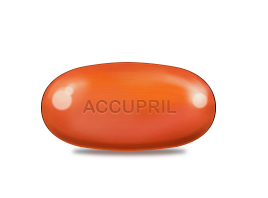we accept  Accupril
Accupril

Accupril is an ACE inhibitor which is used to treat high blood pressure (hypertension), heart failure and to protect the kidneys from harm due to diabetes.
- Availability: In Stock (61 packs)
- Active Ingredient: quinapril
| Package | Per Pill | Savings | Per Pack | Order |
|---|---|---|---|---|
| 30 pills | $55.98 | |||
| 60 pills | $1.60 | $15.88 | $111.96 $96.08 | |
| 90 pills | $1.31 | $49.99 | $167.94 $117.95 | |
| 120 pills | $1.20 | $80.43 | $223.92 $143.49 |
Accupril (Quinapril)
General information
Accupril belongs to the class of medications called ACE inhibitors. It is used for the treatment of high blood pressure (hypertension) and congestive heart failure. It works by relaxing blood vessels and by making the heart pump more efficiently. Lowering high blood pressure helps prevent strokes, heart attacks, and kidney problems. It may be used in addition to diuretics (water pills) known as thiazide diuretics (hydrochlorothiazide) when one medication has not been found to control blood pressure satisfactorily. This medication may also be used to help protect the kidneys from harm due to diabetes.
Directions
Take Accupril exactly as prescribed by your doctor. The recommended dose ranges from 5 mg to 40 mg daily in one dose or two divided doses, taken with or without meals. The recommended starting dosage for treatment of high blood pressure (hypertension) is 10 mg or 20 mg once daily or divided into two smaller doses (5 mg to 10 mg twice a day). The recommended starting dose for treatment of congestive heart failure is 5 mg twice a day. It should be taken by mouth with a glass of water. Accupril should be taken on an empty stomach.
Precautions
Before taking Accupril you should talk with your doctor if you have collagen vascular disease (lupus, scleroderma), heart disease, including congestive heart failure, aortic stenosis, or hypertrophic cardiomyopathy, liver disease, cirrhosis, kidney disease or kidney failure, diabetes, angioedema. This drug may make you dizzy. Do not drive or perform tasks that require alertness. Avoid drinking alcohol. It can further lower your blood pressure and may increase some of the side effects.
Contraindications
You should not take Accupril if you are allergic to quinapril or any of the ingredients of the medication, or if you have angioedema after taking any ACE inhibitors (captopril, ramipril). Let your doctor know if you are pregnant, breastfeeding or on dialysis.
Possible side effect
Get emergency medical help if you have feeling light-headed, fainting, chest pain, pale skin, muscle weakness, urinating more or less than usual, fever, chills, body aches, flu symptoms, red skin rash, uneven heartbeats, jaundice (yellowing of the skin or eyes), hives, stomach pain, difficulty breathing, swelling of your face, lips, tongue, nausea, vomiting, diarrhea, cough. If you notice other effects not listed above, contact your doctor.
Drug interactions
Tell your doctor about all other medications you use, especially: diuretics (furosemide, torsemide, bumetanide), lithium, injectable gold, nonsteroidal anti-inflammatory drugs (celecoxib, etodolac, naproxen, ibuprofen), potassium-containing products, potassium-sparing diuretics (amiloride, triamterene, spironolactone), tetracycline. Interaction between two medications does not always mean that you must stop taking one of them. Tell your doctor about all prescription, over-the-counter, and herbal medications you are taking.
Missed dose
Take the missed dose as soon as possible. Skip the missed dose if it is time for your next scheduled dose. Don't take extra medicine to make up the missed dose.
Overdose
If you think you have overdosed the medicine seek emergency medical help at once. The overdose symptoms are severe dizziness, fainting, low blood pressure, increased levels of sodium or potassium in the blood.
Storage
Store the medicine at room temperature between 59-86 degrees F (15-30 degrees C) away from light and moisture. Do not store the drugs in the bathroom. Keep all drugs away from reach of children and pets.
Note
The information presented at the site has a general character. Note please this information cannot be used for self-treatment and self diagnosis. You should consult with your doctor or health care adviser regarding any specific instructions of your condition. The information is reliable, but we concede it could contain mistakes. We are not responsible for any direct, indirect, special or other damage caused by use of this information on the site and also for consequences of self-treatment.
